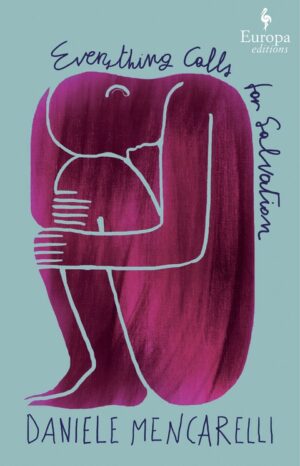You have no items in your cart. Want to get some nice things?
Go shopping
“Today mental illness is not the only thing being treated, today, it’s the enormity of life, the miracle of an individual’s uniqueness. It unsettles people, so science wants to contain and catalogue” – Mario, Everything Calls for Salvation.
- June. Italy. A psychiatric ward.
Daniele Mencarelli has been sentenced to a week of involuntary confinement. We meet him as he meets his roomates for the next couple of days. Through his eyes we learn their stories, their fears and struggles. Winner of the 2020 Youth Strega Prize, Everything Calls for Salvation is an intimate and poignant recollection of the author’s own time spent in a psychiatric ward. That said, the autobiographical component of the story doesn’t take the lead, and the tribulations we witness aim to challenge the readers’ views on life, pain and the fragility of the human psyche itself.
Wendy Wheatley’s careful and commendable translation chooses to make us aware we’re in a translated world, adding foreigness to the other-worldliness of the psychiatric ward. Everything tells us we’re in Italy, from the dropped “mamma mias” to the truncated names (Ma’ for Mario, Gianlu’ for Gianluca, Danie’ for Daniele). The lyrical nature of the original Italian is transposed with great care, allowing the reader to dive without restraint into the thornier questions Daniele encounters during his seven-day confinement. The book is split into seven chapters, one for each day and night where we follow Daniele in his discovery of the “nuthouse.”
The narration is at times raw and painful, mirroring the different dynamics at play: sad and tired nurses who bring their personal issues to work; distant and disinterested doctors who give their patients a cold shoulder, treating them as mere puzzles to solve; and of course “nutcases,” the patients themselves. Daniele’s roomates show very distinct and complex personalities. Some drown in their own mind, others seem to still have some fight left in them, but all, with no exception, are simple human beings living in a cruel world. The nurses, the patients, the doctors, they’re all one major life-changing event away from self-destruction. The author takes us by the hand throughout this journey, showing us how violence – physical or mental – is but an accident. It’s unnecessary in all its forms, but it happens nonetheless due to the inherently flawed nature of our humanity.
The space of the action which at first is claustrophobic, slowly gains layers and expands, becoming a microcosm with its own rules and regulations. Interferences from the outside come in the form of phone calls, parents’ visits and the World Cup broadcast on TV. But the spell is never broken and we remain firmly secluded in the psychiatric ward. The ever-present heat of a warm Italian summer – almost solid and suffocating – acts as a reminder of the limit of this parallel universe. The heatwave is another bar for Daniele’s cage within the hospital, where days flow incredibly slowly. Meanwhile, real life goes on outside at a normal, much higher speed. Within the ward, a beautiful summer day becomes endless and boring. Boredom settles in, forcing Daniele to deal with his own thoughts. Pained by guilt towards his family, he imagines them enjoying their lives without him, perhaps even happier in his absence. All his worries reveal a child-like attachment to his mother, whose erratic and incoherent love for him is a fine portrayal of a mother-son relationship, especially within the subcontext of this part of Italy in the 90’s. However, far from being hopeless, Daniele’s time in the ward is starred by his insightful conversations with his roommates. A sense of comradery blooms among the “inmates,” allowing Daniele to feel understood, maybe for the first time in a long while. So much so that when things take a turn for the worst, Daniele’s reaction betrays a deep bond with the other patients, a connection that has already turned into friendship.
Ultimately, the real protagonist is the psychiatric hospital itself, together with whichever stories unfold within it: the dialogue, the exchange of lived experiences are the real power of this book. In this secluded world, being sentenced to mandatory mental treatment is not the real punishment, but rather “the reiteration of past experiences, like re-runs of a show” in which all patients seem to be trapped. All “sickos” do a fine job of hurting themselves, rendering completely pointless whatever physical violence may be exercised by the nurses on the patients, whether it is deliberate or not. Daniele for example is the youngest, and therefore the one who appears to have more hope than the others. He is, however, riddled with guilt for his actions and his mistreatment of his family. We see his desperate wish to get better, as well as his lucid albeit dreamy relationship with drugs. We see him chasing after a child-like state of happiness that remains elusive – even with the drugs – which makes him trip over his better instincts and reiterate patterns of flight, aggression and guilt.
As already said, the book is an account of the author’s own struggles as a young man. Yet perhaps as part of the therapeutic act of retelling his own story, Mencarelli leaves us bread crumbs along the way in the form of words of wisdom from one of Daniele’s roommates, Mario. With these, we’re able to trace our way out of young Daniele’s mind, as Mario explains how drugs and doctors can give only a little respite, but the real work needs to come from within – a lesson our young Daniele is not yet able to process. It is in particular through Mario’s more nuanced perspective, that we understand the author’s own feelings – matured no doubt by the events described in the novel – that medicine and doctors can be sometimes be wrong. Each patient is left with a degree of personal responsibility to get better on their own so that to some degree, we’re taught that happiness is a choice. Yet, in front of the everpresent crashing weight of Daniele’s fears, it is a choice he’ll probably still struggle to make for a while longer.
To speak of one’s own life is certainly no easy feat, especially when recounting a difficult experience in order to dissect it, and somehow exorcise it within a novel. This author’s sharp pen was able to condense heavy, existential questions in what is ultimately a light read, meant for a younger audience. All philosophical questions throughout the book are unanswerable in nature, but we’ve all asked them ourselves at some point in our lives: what is normal? What does it even mean to be “sane”? We too, like anyone in this book, are one life-altering event away from losing grip on reality.
In the end, this book is a humane lesson on how to remain kind and sensitive towards our fellow struggling humans. Everyone is worthy of being listened to: the healthy, the crazied and the sickos.
Netflix has recently released a TV show based off of this book, which for the most part remains faithful to its spirit. Some of the choices made for the screen adaptation do though impose on the viewer a one dimensional reading of the original message. Everything Calls for Salvation is an authentic and honest book that shows its readers the rich, polyhedric and relatable inner world of its author. It offers no easy answers, and deserves to be read.
Everything Calls For Salvation
by Daniele Mencarelli
Translated from the Italian by Wendy Wheatley
Europa Edition, 176 pages

Francesca Ferrauto
Francesca Ferrauto‘s poetry, fiction, and essays have appeared in Gravitas, Beyond Words, From Whispers to Roars, Berlino Magazine, Il Mitte, and other journals. Born by the Mediterranean, she lived in London, Kyoto, and is now based in Berlin, where she is a Digital Editor, and a Communications Coordinator for SAND.
- Web |
- More Posts(3)




